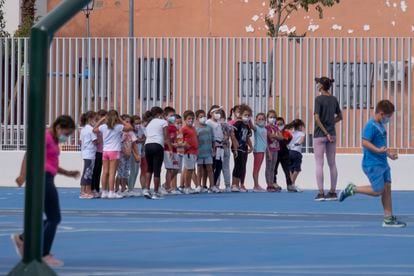Spain’s coronavirus incidence rate falls below 100 cases per 100,000 among all age groups
The improved epidemiological situation has led to calls for face mask rules in elementary schools to be lifted
/cloudfront-eu-central-1.images.arcpublishing.com/prisa/YKFGOA2ROKAHJUMX7B6VWTS7RA.jpg)
Transmission rates of the coronavirus in Spain continue to fall, while pressure on the healthcare system is easing. That’s according to the latest Health Ministry report released on Monday. The figures, which include data from Saturday and Sunday as no reports are issued on the weekend, show that the 14-day cumulative number of cases per 100,000 inhabitants has fallen to below 100 among all age groups. This is the first time this has happened since June 29, when the ministry began to break down transmission rates by age.
On a national level, the 14-day incidence rate now stands at 54.12 cases per 100,000, down from 57.91 on Friday. This means that Spain continues to be at medium risk (an incidence rate of between 50 and 150), according to the coronavirus alert system approved by health authorities.
The coronavirus is spreading most among the under-12 population. According to Monday’s report, the 14-day number of cases per 100,000 inhabitants for this age group is 96.21. The second-highest transmission rates are among the 30-39 population (58.46), followed by the 40-49s (55.18), the over-80s (51.6), the 20-29s (50.52), the 12-19s (41.92), the 60-69s (42.36), the 50-59s (41.39) and the 70-79s (39.49).
Of Spain’s regions, which are in charge of their healthcare systems, vaccination drives and coronavirus restrictions, two have entered the so-called new normality, i.e. an incidence rate of under 25 cases per 100,000. They are Asturias, with 16.10 cases, and Galicia, with 22.95. According to Monday’s report, five regions also are in a low-risk situation (25-50 cases): Castilla y León (35.62), Valencia (42.89), Andalusia (42.66), Navarre (47.34) and La Rioja (41.89). The remaining 12 territories are at medium-risk: Canary Islands (50.64), Extremadura (51.50), Castilla-La Mancha (54.71), Madrid (56.64), Basque Country (58.86), Murcia (64.58), Balearic Islands (67.86), Aragón (81.31), Catalonia (81.90), Cantabria (85.43), and the North African exclave cities of Ceuta (85.51) and Melilla (117.14).
Meanwhile, there are currently 2,364 Covid-19 patients in hospitals, equating to an occupancy rate of just 1.95%, down from 1.99% on Friday. Pressure on intensive care units (ICU) is also easing, with occupancy falling from 7.45% to 6.99% on Monday, according to the latest figures. Since the start of the pandemic, 4,965,399 coronavirus cases have been detected in Spain, while the official death toll stands at 86,527.

As the epidemiological situation improves, there are growing calls in Spain for the mandatory use of face masks in elementary schools for the over-sixes to be lifted. The challenge, say experts, is knowing when and how to do so in a way that will not lead to a spike in infections among the only group of the population – the under-12s – who are not vaccinated against Covid-19, as no vaccine has yet to be approved for the age group.
Clara Prats, a computational biology researcher at Catalonia’s Polytechnic University (UPC), says there are three issues to take into account: the entry of the virus in schools, its transmission in enclosed spaces and the possibility of outbreaks among children that would spread to the wider population.
“Seventy percent of students are infected outside of schools, meaning that the most important variable is achieving a low incidence among the general population,” she explains.
Prats adds that face masks, in addition to other safety measures such as classroom bubbles, were key to enabling schools to remain open in Spain, even when there were high transmission rates in the country.
But many parents believe it is time for the measure to be lifted. Leticia Cardenal, the president of the family association CEAPA, says most parents want elementary school children to be excused from wearing face masks – a position that is backed by the education branch of the UGT workers union, and AFFAC, a Catalan organization for the parents of schoolchildren.
“There are family gatherings indoors, bars and nighttime venues open… Perhaps it’s the moment to free the little ones [from wearing face masks],” says Lluís Clavet, the parent of a seven-year-old student.
Third Covid-19 doses
The European Union’s drug regulator, the European Medicines Agency (EMA), opened the door Monday to allowing EU countries to administer a third dose of Pfizer-BioNTech’s Covid-19 vaccine to adults with normal immune systems.
In a press release, the EMA said that an extra shot of the Pfizer vaccine caused a rise in antibody levels when the dose is given “approximately six months after the second dose in people from 18 to 55 years old.” As such, EU governments “could adopt recommendations” to administer a third Pfizer shot to all adults.
With respect to the Moderna vaccine, the EMA said it is “still evaluating the available information” on whether it should be administered to adults with normal immune systems.
The EMA also stated that an extra dose of both Covid-19 vaccines could be given to people with severely weakened immune systems – a step Spain, and several other EU countries, have already taken.
English version by Melissa Kitson.
/cloudfront-eu-central-1.images.arcpublishing.com/prisa/L7S4Z2F6CFJPLUEBMVXI3NZM4M.jpg)
/cloudfront-eu-central-1.images.arcpublishing.com/prisa/XRYSBLKEU5CWZIYGXTDXN5F2V4.jpg)










































